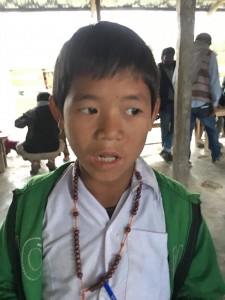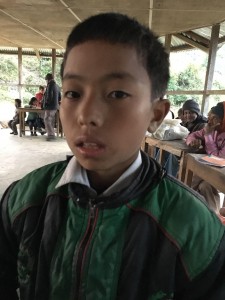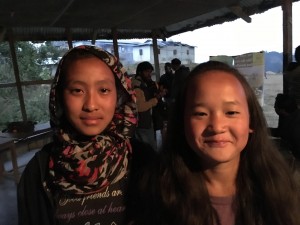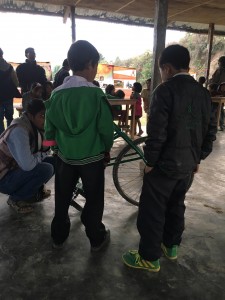


 Amazingly creative children in the land of rising Sun: Arunachal Pradesh Dora James and Tanya Taring, two class six children did not take too long to answer when asked questions about unmet local social needs. Farmer innovators, school teachers, professionals, engineers, students, professors etc., had been debating about several problems noticed in Tajing village as a part of 36th shodhyatra in lower Subansari district, Arunachal Pradesh. Both Dora and Tanya surprised us with their empathy, social sensitivity and enormous capacity to handle various technological challenges. We had seen people dragging bamboo to their homes for processing on their shoulders after harvesting it from their farm. Shodhyatris had debated previous night for an hour about different ways of reducing drudgery in this task. These kids didn’t take a minute to suggest a solution of a simple wheel stand to support bamboo on one side to reduce drag load. Having been encouraged from their curiosity and samvedansheelta, we asked to point out more areas where innovation was needed. They quickly pointed out a need for a low cost plough that can help them till small undulating plots of cardamom, upland paddy, ginger etc. we showed them a cycle wheel plough ( fig 1). They immediately started pointing out various improvements in this plough to suit their conditions. Can there be two wheels, can harrow be replaced by a spade, can there be break because of slopes, and so on. We gave rs 2000 to the teacher of that government school to help these twkids to fabricate the cycle plough of their choice. National Start-up policy, as I said in the last week column, may pay attention to the creativity of children and realise the need for supporting them for starting enterprises soon but the Honey bee Network had decided to invest in these ideas already. SRISTI did not wait for any procedure or requirements. Children have ideas, they need immediate support. Unless the country can develop an agile responsive and impatient system of supporting innovations at grassroots, much of our promises to young people will remain mere promises. Gopal bhai bhise’s cycle weeder found new incarnation in arunachal Pradesh. Khoda yam, and tanya yaming, two girls of seventh class found that manual dibbler for sowing seeds of paddy and other crops designed by manuskhnhai jagani needed to be lighter, more adaptable and flexible for local needs. Our engineers at sristi had not thought about several limitations that these two girls pointed out. Yet national innovation policy is not posing enough faith in the potential of young children. It is not just two innovations per school but may be dozens that may need support. But where is the nurturant and empathetic agile micro venture innovation fund ( except a small fund at NIF) at local level which can encourage children to try, fail, try and try again, to succeed in a few cycle of trial and error. Mr Ramesh Negi, Chief Secretary, Arunachal Pradesh felt very enthusiastic about various ideas we shared with him including the above examples. He has promised to initiate action of several suggestions and we are sure that Arunachal Pradesh will show a new model for innovation promotion in the country. I am quire hopeful that shodhytras organised by SRISTI in collaboration with NIF, GIAN, IIMA and so many volunteers of Honey Bee Network including Nature Care and Disaster Management Society ( NCDMS) of the state will lead to a long term change in education, culture, institutions and technological policy of the state and the country. How long can the leaders ignore the creativity at grassroots? More about the rich traditional knowledge, community institutions, women’s rich food formulations, and innovations by common people ignored to an extent in the start-up policy in the next week.
Amazingly creative children in the land of rising Sun: Arunachal Pradesh Dora James and Tanya Taring, two class six children did not take too long to answer when asked questions about unmet local social needs. Farmer innovators, school teachers, professionals, engineers, students, professors etc., had been debating about several problems noticed in Tajing village as a part of 36th shodhyatra in lower Subansari district, Arunachal Pradesh. Both Dora and Tanya surprised us with their empathy, social sensitivity and enormous capacity to handle various technological challenges. We had seen people dragging bamboo to their homes for processing on their shoulders after harvesting it from their farm. Shodhyatris had debated previous night for an hour about different ways of reducing drudgery in this task. These kids didn’t take a minute to suggest a solution of a simple wheel stand to support bamboo on one side to reduce drag load. Having been encouraged from their curiosity and samvedansheelta, we asked to point out more areas where innovation was needed. They quickly pointed out a need for a low cost plough that can help them till small undulating plots of cardamom, upland paddy, ginger etc. we showed them a cycle wheel plough ( fig 1). They immediately started pointing out various improvements in this plough to suit their conditions. Can there be two wheels, can harrow be replaced by a spade, can there be break because of slopes, and so on. We gave rs 2000 to the teacher of that government school to help these twkids to fabricate the cycle plough of their choice. National Start-up policy, as I said in the last week column, may pay attention to the creativity of children and realise the need for supporting them for starting enterprises soon but the Honey bee Network had decided to invest in these ideas already. SRISTI did not wait for any procedure or requirements. Children have ideas, they need immediate support. Unless the country can develop an agile responsive and impatient system of supporting innovations at grassroots, much of our promises to young people will remain mere promises. Gopal bhai bhise’s cycle weeder found new incarnation in arunachal Pradesh. Khoda yam, and tanya yaming, two girls of seventh class found that manual dibbler for sowing seeds of paddy and other crops designed by manuskhnhai jagani needed to be lighter, more adaptable and flexible for local needs. Our engineers at sristi had not thought about several limitations that these two girls pointed out. Yet national innovation policy is not posing enough faith in the potential of young children. It is not just two innovations per school but may be dozens that may need support. But where is the nurturant and empathetic agile micro venture innovation fund ( except a small fund at NIF) at local level which can encourage children to try, fail, try and try again, to succeed in a few cycle of trial and error. Mr Ramesh Negi, Chief Secretary, Arunachal Pradesh felt very enthusiastic about various ideas we shared with him including the above examples. He has promised to initiate action of several suggestions and we are sure that Arunachal Pradesh will show a new model for innovation promotion in the country. I am quire hopeful that shodhytras organised by SRISTI in collaboration with NIF, GIAN, IIMA and so many volunteers of Honey Bee Network including Nature Care and Disaster Management Society ( NCDMS) of the state will lead to a long term change in education, culture, institutions and technological policy of the state and the country. How long can the leaders ignore the creativity at grassroots? More about the rich traditional knowledge, community institutions, women’s rich food formulations, and innovations by common people ignored to an extent in the start-up policy in the next week.
anil k gupta blog
creativity, compassion, collaboration, curiosity© Copyright : Readers are free to use any material at my blog as they please with due acknowledgement. But if they decide to otherwise, i don't mind so long as they use it for expanding public knowledge goods or improving humanitarian conditions anywhere in the world.

The post-hoc journey of these encounters needs to be monitored till the potential of the grass root aspirations reach to optimum level. I dont know whether the techer taking INR 2000 did something or Chief Secretary too get engaged in somewhere else